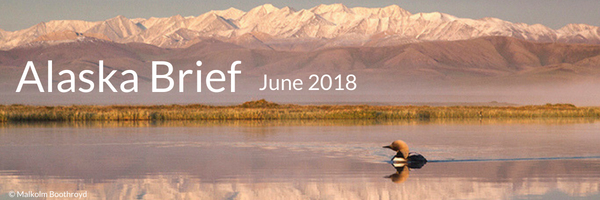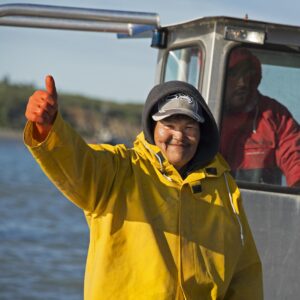Alaska Brief Newsletter–June 2018
When a Minnesota raccoon’s scaling of a skyscraper went viral last week, people couldn’t turn away.
Would the young urban raccoon make it to safety? Why did she keep climbing when so exposed? With so little to cling to, how did she hang on?
We should ask ourselves these same questions.
How do we hold on?
Fighting to protect natural places and human rights feels a lot like scaling that vertical wall right now. As agencies and elected officials promote the profit interests of the wealthy and powerful over the public interest of us all, we find ourselves hanging on to very little and having no clear view of where we’re going or where we might end up.
Can we keep our lands, waters, wildlife, people, and communities safe? Why do we keep fighting when faced with an overwhelming onslaught of attacks? With no end in sight, how do we hold on?
The climb ahead seems without end. As soon as this administration took office, the Department of the Interior made extraction of minerals, coal, and gas its singular goal. It started by setting arbitrary time and page limits for environmental impact statements in order to speed up development projects and minimize any environmental protections.
The very substance of environmental review is lost when the length and timeline matter more than the thoroughness and accuracy of its content. An arbitrary one-year deadline and 150-page limit fundamentally disregards important science, research, data, and public input by literally making no room for it.
In Alaska, the U.S. Army Corps of Engineers and the Bureau of Land Management have taken actions to limit public comment during scoping periods for the proposed Pebble mine and oil leasing in the coastal plain of the Arctic National Wildlife Refuge. They have controlled whether and how people can speak at these hearings, and they have closed hearings before everyone could speak.
Sending an email to an undisclosed email address or government form isolates us from others. Speaking out and hearing other Alaskans and Americans speak out empowers and emboldens us, especially when we each learn that we are not the lone voice in the wilderness.
Lessons from a racoon
The effort to stymy public voices is counter to democracy and our fundamental rights. Americans fought wars to protect our right to petition the government and have a voice in making decisions.
Here, we can learn a lot from #MPRraccoon.
We need to start climbing that wall of obstacles, even when we feel tired and vulnerable. We need to demand that public servants look after all of our interests–not just the few with money. We need to tell agencies what we care about and why; and we need to demand that they use the tools of science and traditional knowledge when looking at the harm development projects can do to public health, clean water and air, the migration routes of animals, social systems, traditional food sources and cultures, and much more.
Right now, we can speak out about oil and gas leasing in the Arctic Refuge until June 19 and the proposed Pebble mine until June 29.
The only way to protect wild places and human rights is to keeping fighting for them. When exhausted, we all need to go into the wild places and secret fishing holes we love for rejuvenation, but then return to the work ahead. Remain dogged, focused, and willing to stay engaged.
We may not have the super powers of raccoons, but like raccoons, we will take risks to protect what we care about, and what feeds our spirits and connects us to each other.

Vicki Clark
Executive Director
PS: Your support of Trustees for Alaska is critical now more than ever.






